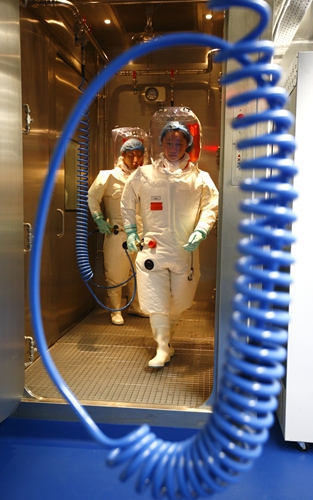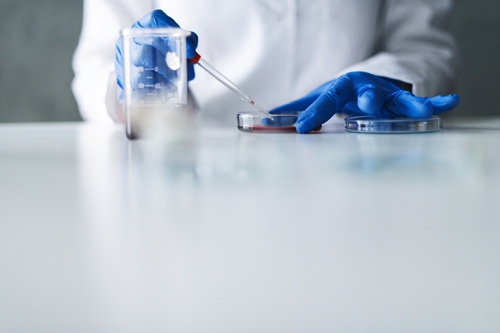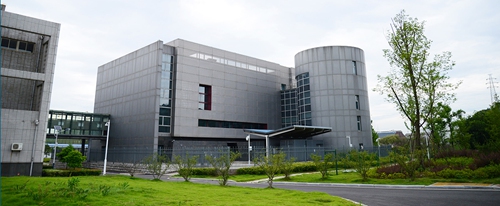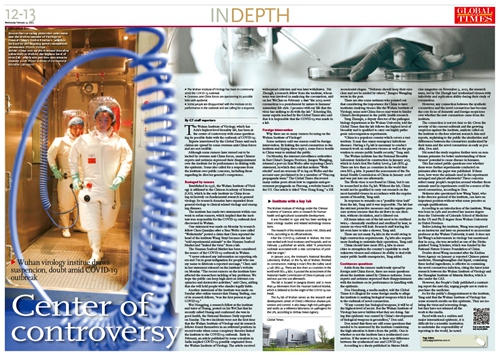HOME >> CHINA,SPECIAL-COVERAGE
Wuhan virology institute draws suspicion and doubt amid COVID-19 outbreak
By GT staff reporters Source:Global Times Published: 2020/2/18 21:38:40
○ The Wuhan Institute of Virology has been in controversy amid the COVID-19 outbreak
○ Overseas anti-China forces are questioning its possible links with epidemic
○ Some people are disappointed with the institute on its performance in the outbreak and are calling for a response

The Wuhan Institute of Virology, which has Asia's highest-level biosafety lab, has been at the center of controversy with some questioning its possible links with the outbreak of COVID-19.
Experts interviewed by the Global Times said such claims are spread by some overseas anti-China forces and are not credible.
Although some rumors have turned out to be incited by overseas anti-China forces, many Chinese experts and netizens expressed their disappointment over the institute for its performance in dealing with the epidemic. Some also called for a response from the institute over public concerns, including those regarding its director general's competence.
Besieged by rumors
Established in 1956, the Wuhan Institute of Virology is affiliated to the Chinese Academy of Sciences (CAS), which is the only institute in China focusing exclusively on fundamental research in general virology. Its research domains have expanded from general virology to clinical related virology and emerging diseases.
The institute has made two statements within one week to refute rumors, which implied that the institute was responsible for the COVID-19 outbreak first discovered in Wuhan.
One statement was made on Monday by research fellow Chen Quanjiao after a Sina Weibo user called "Weiketiezhi" posted a claim that Chen reported the head of the institute Wang Yanyi because she had "sold experimental animals" to the Huanan Seafood Market and "leaked the virus" from a lab.
The Huanan Seafood Market has been considered the source of the COVID-19 outbreak in Wuhan.
"I never released any information on reporting others and I'm in great indignation for people who use my name to fabricate a reported message," Chen said in her statement released on the institute's website on Monday. "The recent rumors on the institute have affected the researchers tackling of key problems. We hope the public can keep high alert on relevant conspiracies and destructive activities," said Chen, adding that she will hold people who slander legally liable.
Another statement of the institute was made on Sunday after online rumors that Huang Yanling, one of its research fellows, "was the first person to get COVID-19."
Wei Hongping, a research fellow at the institute and tutor of Huang, posted on his WeChat that he recently called Huang and confirmed she was in good health, the National Business Daily reported on Sunday. The two incidents were not the first time that the Wuhan Institute of Virology and its research fellows found themselves in an awkward positiom in recent weeks when some conspiracy theories linked the institute to the COVID-19 outbreak.
Early in February, an article published by some scientists in India implied COVID-19 possibly originated from the Wuhan Institute of Virology. The article received widespread criticism and was later withdrawn. Shi Zhengli, a research fellow from the institute, whose team was involved in analyzing the coronavirus, said on her WeChat on February 2 that "the 2019 novel coronavirus is a punishment by nature to humans' unsanitary life style. I promise with my life that the virus has nothing to do with the lab." Echoeing Shi, many experts reached by the Global Times also said that it is impossible that the COVID-19 was made in a lab.
Foreign intervention
Why there are so many rumors focusing on the Wuhan Institute of Virology?
Some netizens said one reason could be foreign intervention. By linking the novel coronavirus to the institute and hyping these topics, some forces hostile to China want to mislead the public.
On Monday, the internet surveillance authorities in East China's Jiangsu Province, Jiangsu Wangjing, released a post on Sina Weibo after reposting Chen's statement, in which they said that netizen "Weiketiezhi" used an overseas IP to log on Weibo and the account user proclaimed to be a member of "Pincong propaganda team." The Global Times discovered many online posts about how to organize anti-government propaganda on Pincong, a website based in the US. One article is titled "Free Hong Kong," a HK secessionist slogan. "Netizens should keep their eyes clear and not be misled by others," Jiangsu Wangjing wrote in the post.

There are also some netizens who pointed out that considering the importance for China to have institutes studying viruses like the Wuhan Institute of Virology, some anti-China forces may want to hinder China's development in the public health research.
Yang Zhanqiu, a deputy director of the pathogen biology department at the Wuhan University, told the Global Times that the lab follows the highest level of biosafety and is qualified to carry out highly pathogenic microorganism experiments.
"China is a populous country which covers a vast territory. It may face many emergency infectious diseases. Having a P4 lab is necessary to conduct research work on unknown viruses as well as the prevention to ensure public health security," Yang said.
The Wuhan institute has the National Biosafety Laboratory finished its construction in January 2015, which is Asia's first Bio-Safety Level 4 Lab (BSL-4). There are less than 20 countries in the world that own BSL-4 labs. It passed the assessment of the National Health Commission of China in January 2018 and was put into use afterwards.
The Ebola virus is not found in China, but it can be researched in this P4 lab. Without the lab, China would not be qualified to carry out research on the most harmful viruses in accordance with the requirements of biosafety, Yang said.
In response to remarks on a "possible virus leak" from the lab, Yang said it was impossible. The lab has the strictest protective measures and its negative pressure system ensures that the air flows in one direction, without circulation, and is filtered out.
All items taken out of the lab need to be sterilized twice,- chemically sterilized and sterilized by heat, to ensure no virus will leak. Research staff leaving the lab even have to take a shower, Yang said.
There are not many P4 labs in the world owing to high construction requirements. P4 labs also require more funding to maintain their operations, Yang said.
China should have more BSL-4 labs in more cities to strengthen the country's capability to study unknown viruses and enhance its ability to deal with major public health emergencies, Yang added.
Continuous questions
Aside from the rumors maliciously spread by foreign anti-China forces, there are some questions about the institute raised by Chinese netizens. Some experts and netizens expressed their disappointment with the institute on its performance in handling with the epidemic.
Dou Hanzhang, a media analyst, told the Global Times it is illogical for some foreign media to allege the institute is making biological weapons which lead to the outbreak of novel coronavirus.
"If any country has biological weapons, it will be of the highest-level of secret. But the Wuhan Institute of Virology has never hidden what they are doing. Saying this epidemic was caused by China's development of biological weapons is groundless," Dou said.
Dou noted that there are still some questions that needed to be answered by the institute considering the high attention it draws from the public. One is whether or not the institute has a synthesized coronavirus. If the answer is yes, is there any difference between the synthesized one and COVID-19?
According to a thesis published in Nature Medicine magazine on November 9, 2015, the research team, led by Shi Zhengli had synthesized viruses with infectivity and replication ability during their study of coronavirus.
However, any connection between the synthetic coronavirus and the novel coronavirus has become the core focus of domestic and foreign suspicions over whether the new coronavirus came from the institute.
The connection is not yet clear so far. Given the severity of the current outbreak and the growing suspicion against the institute, analysts called on the institute to disclose relevant research data and reports, explaining to the public the similarities and differences between the coronavirus synthesized by their team and the novel coronavirus as early as possible, Dou said.
Shi noted the study requires further tests on non-human primates for better understanding of these viruses' potential to cause disease in humans.
This has raised public questions over whether there were further experiments conducted on primates after the paper was published. If there were, how were the animals used in the experiment arranged and placed afterwards? These concerns reflect many people's suspicion around whether those animals used in experiments could be a source of the novel coronavirus, according to Dou.
Netizens also questioned how Wang Yanyi, who is the director general of the institute, can have an important position without what some perceive as enough qualifications.
According to an introduction of the institute, Wang was born in 1981 and received her master degree from the University of Colorado School of Medicine in the US and Ph.D degree from Wuhan University in Hubei Province.
Before joining the institute, Wang was employed as an instructor and later on promoted to an associate professor at the Wuhan University, it said. It does not list Wang's achievements in virology but mentioned that in 2014, she was awarded as one of the Distinguished Young Scholars, which was funded by the National Nature Science Foundation of China.
Doubts about Wang mounted after the Xinhua News Agency on January 31 reported Chinese patent medicine, Shuanghuanglian oral liquid, containing three herbal ingredients, is effective in containing the novel coronavirus infection, citing the latest joint research between the Wuhan Institute of Virology and the Shanghai Institute of Materia Medica, which is also under the CAS.

However, the People's Daily published a contrasting report the next day, urging people not to rush to purchase the medicine.
As for the public's disappointment to the institute, Yang said that the Wuhan Institute of Virology has some research results on this epidemic. They are isolating the virus and screening drugs, but they have not released all the work to the media.
Faced with such a sudden and major international epidemic, it is difficult for a scientific institution to undertake the responsibility of reporting to the world, he noted.
Institute with a key lab
The Wuhan Institute of Virology under the Chinese Academy of Sciences aims to research for human health and agricultural sustainable development.
It was founded in 1956 and has been working on basic virology studies and related technology innovations.
The research of the institute covers HIV, Ebola and H1N1, according to its official website.
After the COVID-19 outbreak in Wuhan, the institute worked with local institutes and hospitals, and on February 3 published an article, titled "A pneumonia outbreak associated with a new coronavirus of probable bat origin."
In January 2015, the Institute's National Biosafety Laboratory, Wuhan, or the P4 lab of Wuhan, finished its construction, making it Asia's first Bio-Safety Level 4 Lab (BSL-4). There are less than 20 countries in the world with BSL-4 labs. It passed the assessment of the National Health Commission of China in January 2018 and was put into use afterwards.
The lab is located in Jiangxia district and is more than 40 kilometers from the Huanan Seafood Market, which is believed to be the origin of the COVID-19 outbreak.
The P4 lab of Wuhan serves as the research and development center of China's infectious disease prevention and control. It also keeps high-risk pathogens and works as a reference laboratory on pathogens for the UN, according to Xinhau News Agency.

Newspaper headline: Center of controversy
○ Overseas anti-China forces are questioning its possible links with epidemic
○ Some people are disappointed with the institute on its performance in the outbreak and are calling for a response

Researchers wearing protective suits enter into the Wuhan Institue of Virology in Central China's Hubei Province, which is hit hard by the ongoing novel cononavirus pneumonia. Photos: Xinhua
The Wuhan Institute of Virology, which has Asia's highest-level biosafety lab, has been at the center of controversy with some questioning its possible links with the outbreak of COVID-19.
Experts interviewed by the Global Times said such claims are spread by some overseas anti-China forces and are not credible.
Although some rumors have turned out to be incited by overseas anti-China forces, many Chinese experts and netizens expressed their disappointment over the institute for its performance in dealing with the epidemic. Some also called for a response from the institute over public concerns, including those regarding its director general's competence.
Besieged by rumors
Established in 1956, the Wuhan Institute of Virology is affiliated to the Chinese Academy of Sciences (CAS), which is the only institute in China focusing exclusively on fundamental research in general virology. Its research domains have expanded from general virology to clinical related virology and emerging diseases.
The institute has made two statements within one week to refute rumors, which implied that the institute was responsible for the COVID-19 outbreak first discovered in Wuhan.
One statement was made on Monday by research fellow Chen Quanjiao after a Sina Weibo user called "Weiketiezhi" posted a claim that Chen reported the head of the institute Wang Yanyi because she had "sold experimental animals" to the Huanan Seafood Market and "leaked the virus" from a lab.
The Huanan Seafood Market has been considered the source of the COVID-19 outbreak in Wuhan.
"I never released any information on reporting others and I'm in great indignation for people who use my name to fabricate a reported message," Chen said in her statement released on the institute's website on Monday. "The recent rumors on the institute have affected the researchers tackling of key problems. We hope the public can keep high alert on relevant conspiracies and destructive activities," said Chen, adding that she will hold people who slander legally liable.
Another statement of the institute was made on Sunday after online rumors that Huang Yanling, one of its research fellows, "was the first person to get COVID-19."
Wei Hongping, a research fellow at the institute and tutor of Huang, posted on his WeChat that he recently called Huang and confirmed she was in good health, the National Business Daily reported on Sunday. The two incidents were not the first time that the Wuhan Institute of Virology and its research fellows found themselves in an awkward positiom in recent weeks when some conspiracy theories linked the institute to the COVID-19 outbreak.
Early in February, an article published by some scientists in India implied COVID-19 possibly originated from the Wuhan Institute of Virology. The article received widespread criticism and was later withdrawn. Shi Zhengli, a research fellow from the institute, whose team was involved in analyzing the coronavirus, said on her WeChat on February 2 that "the 2019 novel coronavirus is a punishment by nature to humans' unsanitary life style. I promise with my life that the virus has nothing to do with the lab." Echoeing Shi, many experts reached by the Global Times also said that it is impossible that the COVID-19 was made in a lab.
Foreign intervention
Why there are so many rumors focusing on the Wuhan Institute of Virology?
Some netizens said one reason could be foreign intervention. By linking the novel coronavirus to the institute and hyping these topics, some forces hostile to China want to mislead the public.
On Monday, the internet surveillance authorities in East China's Jiangsu Province, Jiangsu Wangjing, released a post on Sina Weibo after reposting Chen's statement, in which they said that netizen "Weiketiezhi" used an overseas IP to log on Weibo and the account user proclaimed to be a member of "Pincong propaganda team." The Global Times discovered many online posts about how to organize anti-government propaganda on Pincong, a website based in the US. One article is titled "Free Hong Kong," a HK secessionist slogan. "Netizens should keep their eyes clear and not be misled by others," Jiangsu Wangjing wrote in the post.

Photo: VCG
There are also some netizens who pointed out that considering the importance for China to have institutes studying viruses like the Wuhan Institute of Virology, some anti-China forces may want to hinder China's development in the public health research.
Yang Zhanqiu, a deputy director of the pathogen biology department at the Wuhan University, told the Global Times that the lab follows the highest level of biosafety and is qualified to carry out highly pathogenic microorganism experiments.
"China is a populous country which covers a vast territory. It may face many emergency infectious diseases. Having a P4 lab is necessary to conduct research work on unknown viruses as well as the prevention to ensure public health security," Yang said.
The Wuhan institute has the National Biosafety Laboratory finished its construction in January 2015, which is Asia's first Bio-Safety Level 4 Lab (BSL-4). There are less than 20 countries in the world that own BSL-4 labs. It passed the assessment of the National Health Commission of China in January 2018 and was put into use afterwards.
The Ebola virus is not found in China, but it can be researched in this P4 lab. Without the lab, China would not be qualified to carry out research on the most harmful viruses in accordance with the requirements of biosafety, Yang said.
In response to remarks on a "possible virus leak" from the lab, Yang said it was impossible. The lab has the strictest protective measures and its negative pressure system ensures that the air flows in one direction, without circulation, and is filtered out.
All items taken out of the lab need to be sterilized twice,- chemically sterilized and sterilized by heat, to ensure no virus will leak. Research staff leaving the lab even have to take a shower, Yang said.
There are not many P4 labs in the world owing to high construction requirements. P4 labs also require more funding to maintain their operations, Yang said.
China should have more BSL-4 labs in more cities to strengthen the country's capability to study unknown viruses and enhance its ability to deal with major public health emergencies, Yang added.
Continuous questions
Aside from the rumors maliciously spread by foreign anti-China forces, there are some questions about the institute raised by Chinese netizens. Some experts and netizens expressed their disappointment with the institute on its performance in handling with the epidemic.
Dou Hanzhang, a media analyst, told the Global Times it is illogical for some foreign media to allege the institute is making biological weapons which lead to the outbreak of novel coronavirus.
"If any country has biological weapons, it will be of the highest-level of secret. But the Wuhan Institute of Virology has never hidden what they are doing. Saying this epidemic was caused by China's development of biological weapons is groundless," Dou said.
Dou noted that there are still some questions that needed to be answered by the institute considering the high attention it draws from the public. One is whether or not the institute has a synthesized coronavirus. If the answer is yes, is there any difference between the synthesized one and COVID-19?
According to a thesis published in Nature Medicine magazine on November 9, 2015, the research team, led by Shi Zhengli had synthesized viruses with infectivity and replication ability during their study of coronavirus.
However, any connection between the synthetic coronavirus and the novel coronavirus has become the core focus of domestic and foreign suspicions over whether the new coronavirus came from the institute.
The connection is not yet clear so far. Given the severity of the current outbreak and the growing suspicion against the institute, analysts called on the institute to disclose relevant research data and reports, explaining to the public the similarities and differences between the coronavirus synthesized by their team and the novel coronavirus as early as possible, Dou said.
Shi noted the study requires further tests on non-human primates for better understanding of these viruses' potential to cause disease in humans.
This has raised public questions over whether there were further experiments conducted on primates after the paper was published. If there were, how were the animals used in the experiment arranged and placed afterwards? These concerns reflect many people's suspicion around whether those animals used in experiments could be a source of the novel coronavirus, according to Dou.
Netizens also questioned how Wang Yanyi, who is the director general of the institute, can have an important position without what some perceive as enough qualifications.
According to an introduction of the institute, Wang was born in 1981 and received her master degree from the University of Colorado School of Medicine in the US and Ph.D degree from Wuhan University in Hubei Province.
Before joining the institute, Wang was employed as an instructor and later on promoted to an associate professor at the Wuhan University, it said. It does not list Wang's achievements in virology but mentioned that in 2014, she was awarded as one of the Distinguished Young Scholars, which was funded by the National Nature Science Foundation of China.
Doubts about Wang mounted after the Xinhua News Agency on January 31 reported Chinese patent medicine, Shuanghuanglian oral liquid, containing three herbal ingredients, is effective in containing the novel coronavirus infection, citing the latest joint research between the Wuhan Institute of Virology and the Shanghai Institute of Materia Medica, which is also under the CAS.

China sets up the National Biosafety Laborotary in Wuhan, the highest level of virus lab, which was put into operation in January 2018. Photo: website of the National Biosafety Laboratory
However, the People's Daily published a contrasting report the next day, urging people not to rush to purchase the medicine.
As for the public's disappointment to the institute, Yang said that the Wuhan Institute of Virology has some research results on this epidemic. They are isolating the virus and screening drugs, but they have not released all the work to the media.
Faced with such a sudden and major international epidemic, it is difficult for a scientific institution to undertake the responsibility of reporting to the world, he noted.
Institute with a key lab
The Wuhan Institute of Virology under the Chinese Academy of Sciences aims to research for human health and agricultural sustainable development.
It was founded in 1956 and has been working on basic virology studies and related technology innovations.
The research of the institute covers HIV, Ebola and H1N1, according to its official website.
After the COVID-19 outbreak in Wuhan, the institute worked with local institutes and hospitals, and on February 3 published an article, titled "A pneumonia outbreak associated with a new coronavirus of probable bat origin."
In January 2015, the Institute's National Biosafety Laboratory, Wuhan, or the P4 lab of Wuhan, finished its construction, making it Asia's first Bio-Safety Level 4 Lab (BSL-4). There are less than 20 countries in the world with BSL-4 labs. It passed the assessment of the National Health Commission of China in January 2018 and was put into use afterwards.
The lab is located in Jiangxia district and is more than 40 kilometers from the Huanan Seafood Market, which is believed to be the origin of the COVID-19 outbreak.
The P4 lab of Wuhan serves as the research and development center of China's infectious disease prevention and control. It also keeps high-risk pathogens and works as a reference laboratory on pathogens for the UN, according to Xinhau News Agency.

gt
Newspaper headline: Center of controversy
RELATED ARTICLES: